Keyword research for SEO is the process of identifying the exact words and phrases your target audience uses in online searches. By leveraging the best keyword research tools, you can enhance your SEO strategy significantly. These tools help you pinpoint relevant keywords that potential customers use to discover your products or services on search engines like Google, ensuring your content effectively meets their needs.
In this complete guide, we present the best keyword research tools of 2025, their pricing, and features that make them stand out!
Best Keyword Research Tools [Shortlist]
- Semrush — Best all-in-one solution
- Ahrefs — Best SEO toolkit for SEO professionals
- Google Trends — Best for tracking keyword popularity
- Keywords Everywhere — Best affordable keyword research tool
- Google Search Console — Best for monitoring keyword performance data
- Google Keyword Planner — Best for finding related keywords
- Moz Keyword Explorer — Best for accessing keyword metrics
- Ubersuggest — Best for comprehensive keyword suggestions and content ideas
- AnswerThePublic — Best for visualizing user search queries and intent
- SpyFu — Best for competitor keyword analysis and PPC insights
- KWFinder — Best for finding long-tail keywords with low competition
11 best keyword research tools for SEO
Explore our picks for the top tools for keyword research below!
1. Semrush — Best all-in-one solution
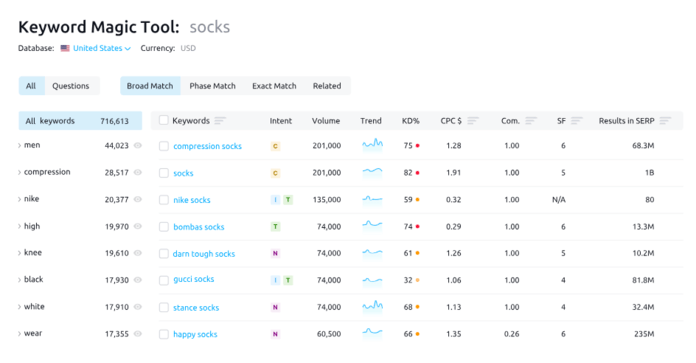
Cost: $129.95/month
Semrush is an integrated digital marketing and SEO platform that offers tools and data to help users enhance their online presence and marketing efforts. It includes features like keyword research, site audits, backlink analysis, and competitive research to assist businesses in optimizing their online strategies and improving their website’s visibility.
Pros:
- All-in-one suite for digital marketing, from SEO to paid advertising
- In-depth keyword research, plus SEO audits, competitor insights, and more
- Extensive keyword database
- Keyword tracking
- Regular tool updates
Cons:
- Too expensive for small businesses and individual webmasters
- Learning curve in understanding the various toolkits
2. Ahrefs — Best SEO toolkit for SEO professionals
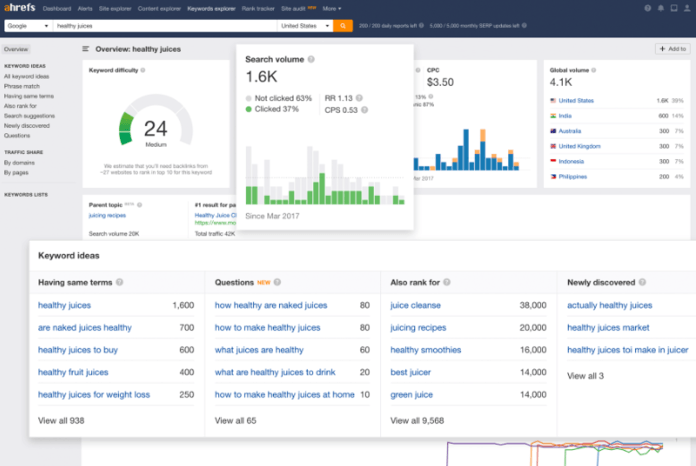
Cost: $99/month
Ahrefs is a web-based SEO tool known for its comprehensive features, including backlink analysis, keyword research, competitive analysis, and site auditing, designed to help users improve their website’s search engine visibility and online marketing efforts. It’s widely used by SEO professionals and website owners to gain insights, optimize their online strategies, and monitor their competition.
Pros:
- Custom keyword metrics, like traffic potential
- Keyword search volume tracking, including zero-volume keywords
- Keyword tracking
- Large keyword database
- Additional SEO tools, like audits, competitor research, and more
Cons:
- Unpopular credit-based pricing model
- Unlike Ahrefs alternatives, Ahrefs is too expensive for smaller sites and businesses
If you’re not sold on Ahrefs, check out our comparison of Ahrefs vs. Moz.
3. Google Trends — Best for tracking keyword popularity
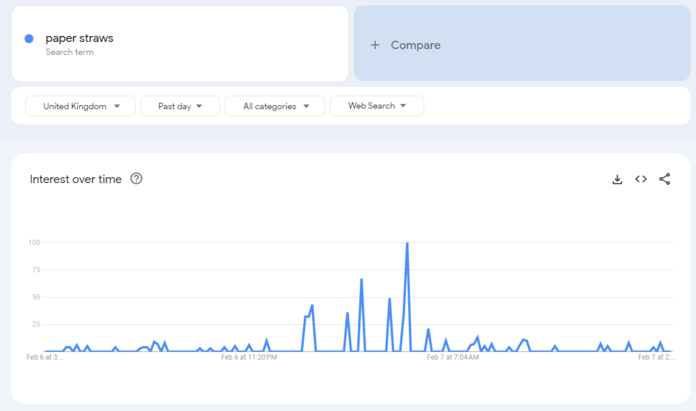
Cost: Free
Google Trends is a free tool provided by Google that allows users to track and analyze the popularity of search queries and topics over time. Google Trends helps users understand search trends, discover related queries, and make data-driven decisions for content creation and marketing strategies.
Pros:
- Real-time insights
- Extensive historical database
- Keyword comparison
- Regional keyword data
- Easy to use
Cons:
- Zero keyword metrics
- No way to save keywords
4. Keywords Everywhere — Best affordable keyword research tool
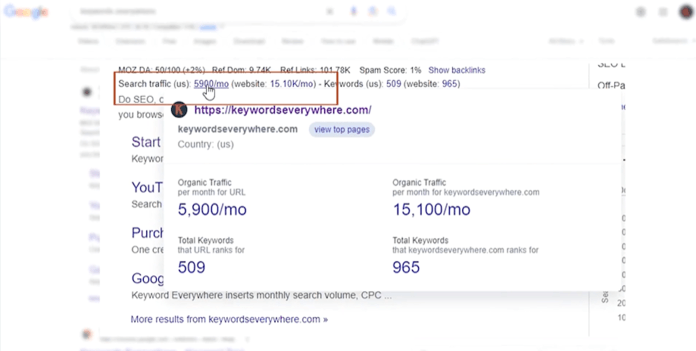
Cost: $15/year
Keywords Everywhere is a browser extension and SEO tool that provided keyword data, including search volume and CPC, while users are browsing the web, particularly on search engine result pages and various websites.
Pros:
- Displays results on other platforms, like YouTube and Google Search Console
- Provides keyword data in search results
- Cost-effective pricing
Cons:
- Lower data accuracy than paid keyword research tools for SEO
- Fewer features than SEO software suites like Ahrefs or Semrush
5. Google Search Console — Best for monitoring keyword performance data
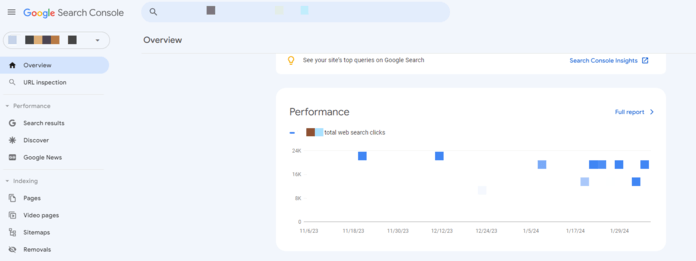
Cost: Free
Google Search Console is a free web service by Google that provides website owners and webmasters with tools and reports to monitor and optimize their website’s performance in Google search results. It offers insights into search traffic, indexing, site errors, and site security issues, helping users improve their online presence and address any potential issues affecting their site’s visibility.
Pros:
- Find keyword opportunities based on your site’s performance
- Get search performance data, like impressions, click-through rate (CTR), and more
Cons:
- No keyword metric data unless paired with another SEO keyword tool like Keywords Everywhere
- Limited to the site owner’s website performance
6. Google Keyword Planner — Best for finding related keywords
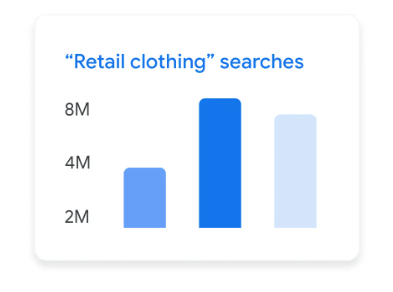
Cost: Free
Google Keyword Planner is a free tool within Google Ads used for keyword research and planning advertising campaigns. It provides data on keyword search volume, competition, and forecasts, making it valuable for advertisers, SEO professionals, and content creators looking to optimize their online strategies.
Pros:
- High data accuracy
- Access keyword metrics like search volume, competition, and cost
- Integrates with Google Ads
Cons:
- Built as a pay-per-click keyword suggestion tool vs. an SEO keyword research tool
- Database focused more on bottom-of-the-funnel search terms
7. Moz Keyword Explorer — Best for accessing keyword metrics
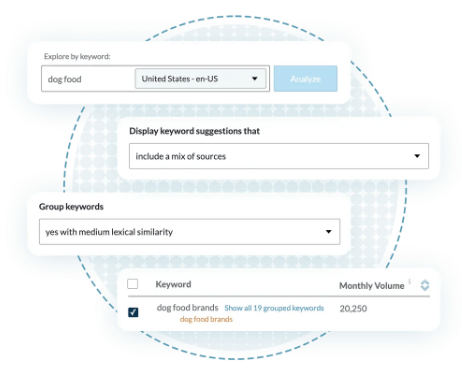
Cost: $99/month
Moz Keyword Explorer is a keyword research tool by Moz, designed to help users discover and analyze keywords for their SEO and content strategies. It provides data on keyword search volume, difficulty, and competitive analysis, aiding in the selection of effective keywords for improved online visibility and content optimization.
Pros:
- Access keyword metrics, including opportunity score
- Get competitor analysis insights
- View search engine results pages (SERPs) opportunities
- Includes access to a full SEO software suite
Cons:
- Higher price than other keyword research tools
8. Ubersuggest — Best for comprehensive keyword suggestions and content ideas
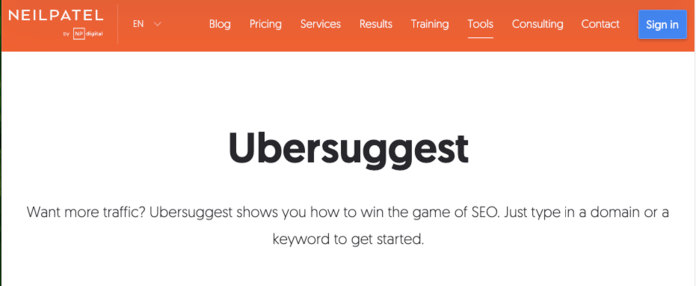
Cost: Free (with premium features starting at $12/month)
Ubersuggest is a keyword research tool created by Neil Patel that provides users with keyword suggestions, search volume data, and SEO difficulty scores. It also offers insights into competitor strategies and content ideas.
Pros:
- User-friendly interface with easy navigation
- Offers keyword suggestions and insights into search volume
- Provides content ideas based on popular keywords
- Includes site audit features to analyze website performance
- Affordable pricing for premium features
Cons:
- Limited features in the free version
- Data accuracy may vary compared to larger competitors
9. AnswerThePublic — Best for visualizing user search queries and intent
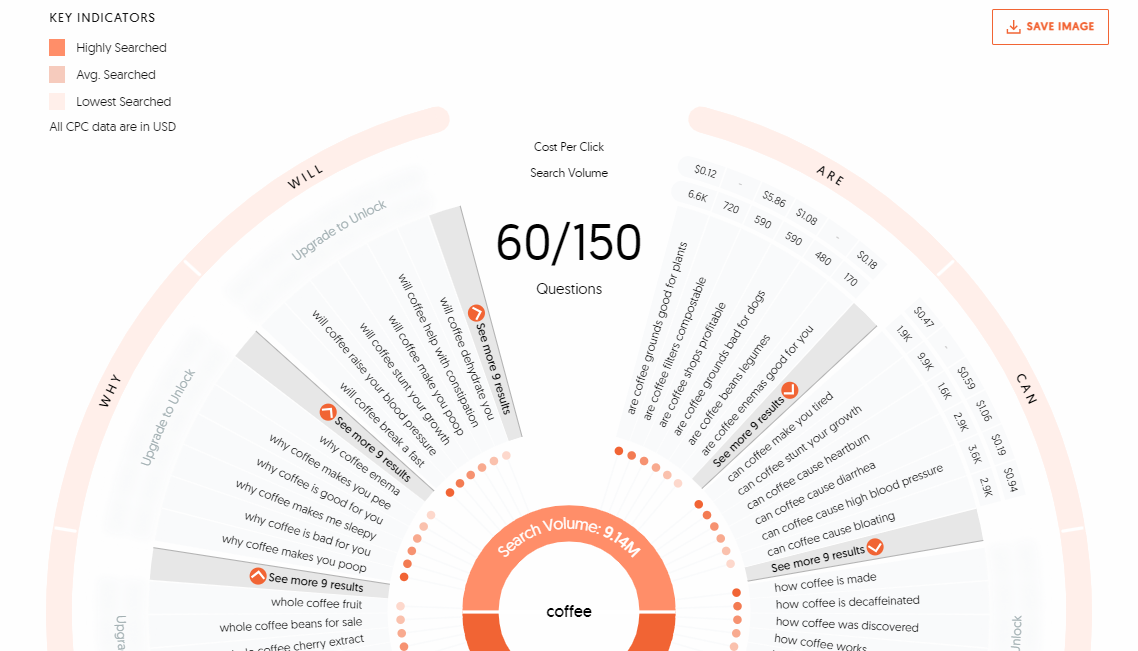
Cost: Free (with premium plans starting at $99/month)
AnswerThePublic is a unique keyword research tool that visualizes search queries and provides insights into what users are asking about specific topics. It generates questions and prepositions related to your keywords, helping to understand user intent.
Pros:
- Visual representation of keyword data
- Generates a wide array of related questions and phrases
- Aids content ideation and understanding user intent
- Easy to use with a straightforward interface
Cons:
- Limited data volume in the free version
- Premium features can be costly for small businesses
10. SpyFu — Best for competitor keyword analysis and PPC insights
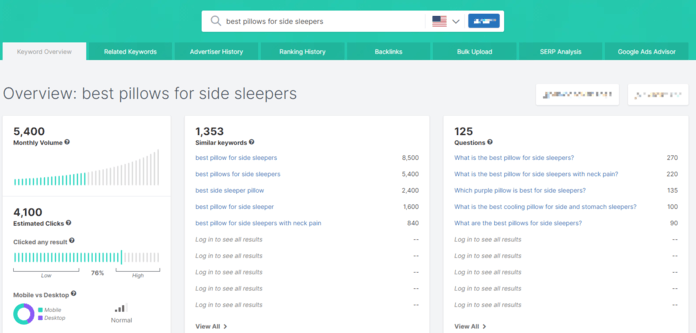
Cost: Plans start at $39/month
SpyFu focuses on competitor research, allowing users to see which keywords their competitors rank for and their PPC spending data. This tool helps businesses uncover opportunities by analyzing competitor strategies.
Pros:
- In-depth competitor analysis for both SEO and PPC
- Historical data on keyword performance and rankings
- Ability to track competitors’ ad spend and strategies
- User-friendly interface
Cons:
- Less focused on organic keyword research than some other tools
- Limited features in lower-tier plans compared to higher tiers
11. KWFinder — Best for finding long-tail keywords with low competition
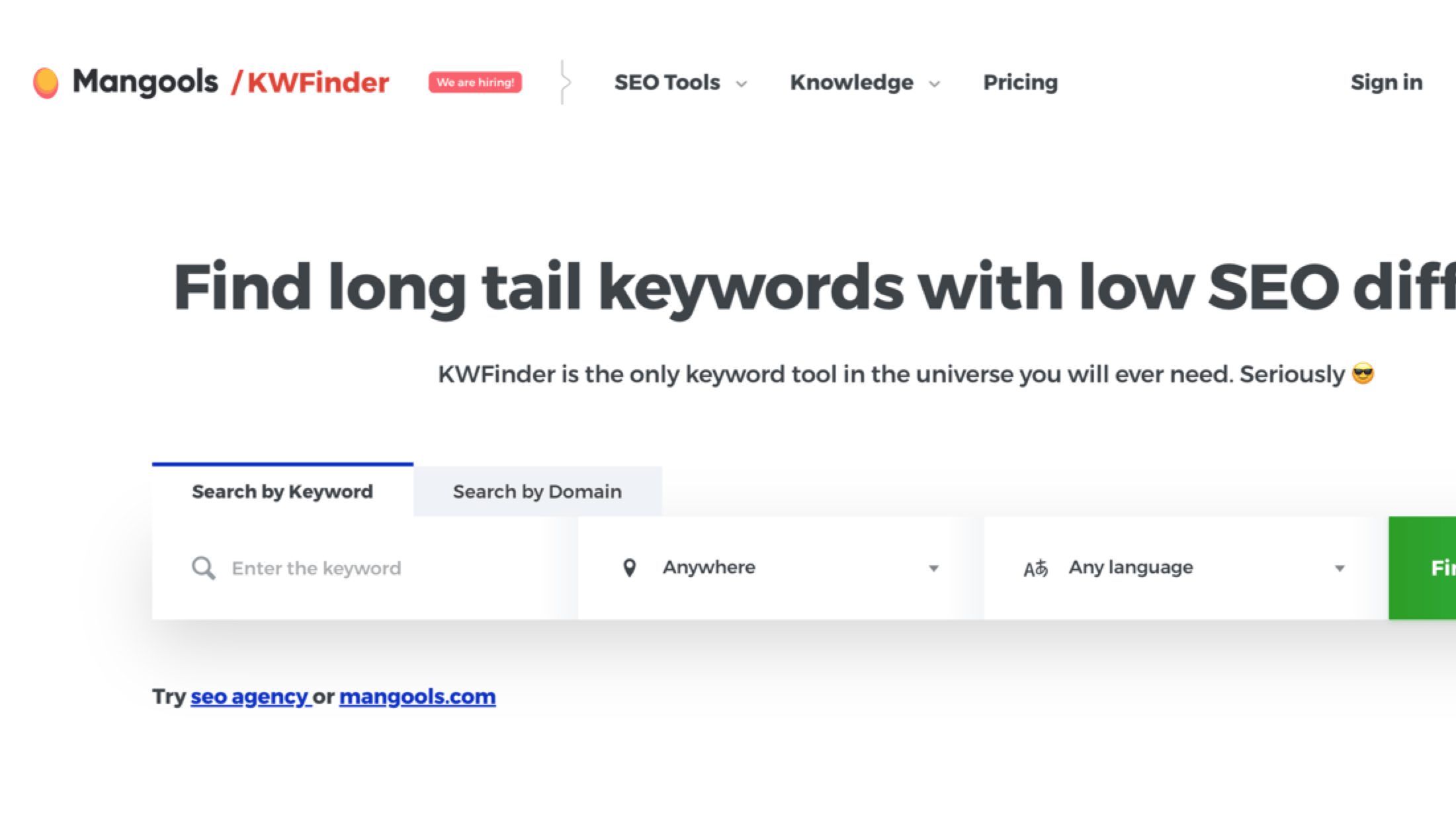
Cost: Plans start at $49/month
KWFinder is a user-friendly keyword research tool that specializes in finding long-tail keywords with low SEO difficulty. It assists users in discovering niche keywords to target for improved search engine rankings.
Pros:
- Intuitive and easy-to-use interface
- Focused on long-tail keywords and low competition
- Provides detailed keyword metrics and SERP analysis
- Ability to track keyword rankings
Cons:
- Limited features in lower-tier plans
- Data may not be as comprehensive as larger tools like Ahrefs or SEMrush
Supercharge your SEO strategy with expert keyword research
Maximize your SEO efforts with our professional keyword research services. Our team will help you identify high-value keywords and analyze competitor strategies to fuel your business growth. Ready to get started? Contact us online today!
Let’s Drive Results Together
FAQs about keyword research tools
Learn more about keyword research tools with these FAQs:
What is a keyword research tool?
A keyword research tool is a free or paid software that provides keyword metrics, like search volume, competitiveness, and cost-per-click (CPC), to help businesses identify the most relevant keywords for their target audience.
Which keyword tool is the most accurate?
Most SEOs will agree that the most accurate keyword tool is a keyword tool for pay-per-click called Google Keyword Planner. People believe Google Keyword Planner is the most accurate because the data comes directly from Google, the largest search engine in the world.
How do I choose the best keyword research tool for me?
You can help your business choose the best keyword research tool for its needs with these tips:
- Outline your budget
- Determine your tool needs
- Demo your top tool choices
- Get your team’s feedback on the tools
The biggest step you can take is getting hands-on experience with the different applications available. If you’re looking at a paid keyword tool, many offer free trials or discounted trials that you can use to experience the software first-hand.
If you’re stuck between tools, check out some of our tool comparisons below:
How do I find the best keywords with keyword research tools?
You can find the best keywords with keyword research tools by:
- Evaluating the keyword’s metrics, like its search volume and competitiveness
- Researching the keyword’s relevancy to your business and its products or services
- Determine the keyword’s search intent
For more information on this topic, check out our walkthrough on how to choose the best keywords.
Table of Contents
- Best Keyword Research Tools [Shortlist]
- 11 Best Keyword Research Tools for SEO
- 1. Semrush — Best All-in-one Solution
- 2. Ahrefs — Best SEO Toolkit for SEO Professionals
- 3. Google Trends — Best for Tracking Keyword Popularity
- 4. Keywords Everywhere — Best Affordable Keyword Research Tool
- 5. Google Search Console — Best for Monitoring Keyword Performance Data
- 6. Google Keyword Planner — Best for Finding Related Keywords
- 7. Moz Keyword Explorer — Best for Accessing Keyword Metrics
- 8. Ubersuggest — Best for Comprehensive Keyword Suggestions and Content Ideas
- 9. AnswerThePublic — Best for Visualizing User Search Queries and Intent
- 10. SpyFu — Best for Competitor Keyword Analysis and PPC Insights
- 11. KWFinder — Best for Finding Long-tail Keywords with Low Competition
- Supercharge Your SEO Strategy with Expert Keyword Research
- FAQs About Keyword Research Tools

Meet
The top digital marketing company behind SEO.com.
Ready to get results? Connect with us, today!
Writers

Related Resources
- 10 Moz Alternatives That Will Help You Nail Your SEO
- 10 Semrush Alternatives According to Reddit, Reviews, and Our Team
- 10 Top PPC Tools for Management, Analysis, and More
- 11 Amazing Tools for Generating Blog Post Ideas
- 12 Best On-Page SEO Tools in 2025 (Free and Paid)
- 12 Ubersuggest Alternatives to Consider for 2025
- 15 Best Surfer SEO Alternatives: 15 Powerful Tools Compared
- 18 Best SEO Analytics Tools in 2025
- 18 of the Best Site Speed Tools to Test Your Website
- 5 Handy Chrome Extensions for Marketing in 2025


